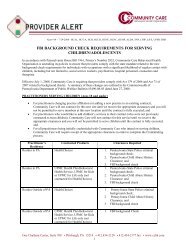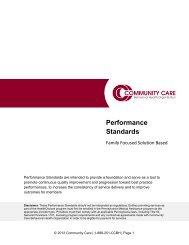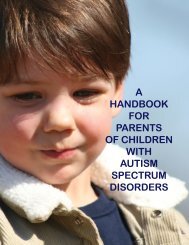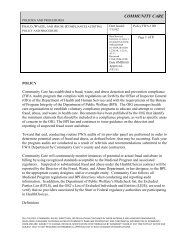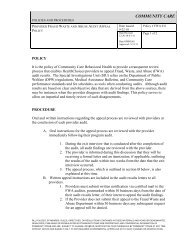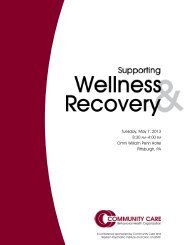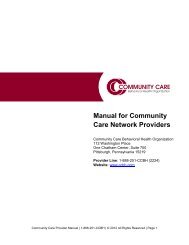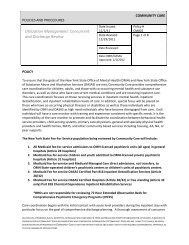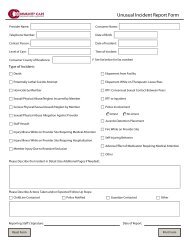a handbook for parents of children with autism spectrum disorders
a handbook for parents of children with autism spectrum disorders
a handbook for parents of children with autism spectrum disorders
Create successful ePaper yourself
Turn your PDF publications into a flip-book with our unique Google optimized e-Paper software.
As a parent, what is my role in the FBA process?<br />
As the parent, you have an important role <strong>of</strong> helping the team understand<br />
your child’s behavior. You have an abundance <strong>of</strong> in<strong>for</strong>mation about the<br />
specific behaviors exhibited by your child and the frequency <strong>of</strong> such<br />
behaviors. In order to provide a complete picture <strong>of</strong> your child’s behaviors,<br />
the team may request that you observe and collect in<strong>for</strong>mation about your<br />
child’s challenging behavior as you observe it in the home and in community<br />
settings. Your observations will help the team develop specific interventions/<br />
strategies to use in your child’s behavior plan. Eventually, you will be trained<br />
to utilize these strategies so that you can more effectively manage your<br />
child’s behavioral concerns.<br />
Is my preschooler too young to have an FBA?<br />
Even if your child is very young, an FBA should be completed. The earlier<br />
that identified challenging behaviors are addressed, the more likely<br />
they can be rectified and replaced <strong>with</strong> more appropriate behaviors. For<br />
example, it is far easier to teach a two- or three-year-old to request items<br />
using a picture card than it is to teach a much older child who has used<br />
tantrums to obtain what he or she wants. The older child has likely “learned”<br />
(through rein<strong>for</strong>cement or reward <strong>of</strong> the behavior <strong>with</strong> the desired object)<br />
that tantrumming is how to get that specific need met and may be more<br />
challenging to address.<br />
Will the FBA help my adolescent enjoy more activities <strong>with</strong>in the<br />
community and perhaps maintain a volunteer or paid job?<br />
A person <strong>with</strong><br />
Autism can be<br />
educated. With<br />
the right structured<br />
support <strong>with</strong>in and<br />
outside <strong>of</strong> school,<br />
individuals <strong>with</strong><br />
Autism can be<br />
helped to reach<br />
their full potential.<br />
Yes, it is much more likely <strong>for</strong> someone to participate in school and<br />
community activities <strong>of</strong> their choice and maintain a paid job or be a successful<br />
volunteer if they have acceptable behaviors in those settings. If a person<br />
engages in challenging behaviors as a means <strong>of</strong> getting what they need or<br />
want, they are not as likely to get along well in community or work settings.<br />
The FBA will help uncover the function <strong>of</strong> the challenging behaviors and<br />
support the development <strong>of</strong> new skills and strategies your child can employ to<br />
get their wants and needs met.<br />
Who should conduct direct observations?<br />
Observations from multiple sources would be best. The pr<strong>of</strong>essional<br />
conducting the FBA, the Behavior Specialist Consultant in BHRS, would work<br />
<strong>with</strong> the team on defining the behaviors, training the team on data collection,<br />
and providing an analysis <strong>of</strong> the data. Depending on where the challenging<br />
behavior is occurring, the person conducting the FBA and all those who<br />
support the person would observe and collect data. If appropriate, <strong>parents</strong><br />
may be asked to collect data as well. It is important to observe the person<br />
- Page 13 -



